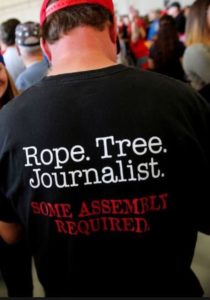News consumers need to find and use sources that are not easily intimidated.

Recent decisions by the Washington Post, CNN, New York Times, ABC/Disney and CBS raise concerns about whether the legacy press will become supplicants to Donald Trump. Reports indicate that CBS is considering a court settlement with Trump in order “to reduce friction with the incoming administration.” And in some cases key corporate leaders have shown excessive deference to this new President who governs by intimidation. A case in point is, veteran and award-winning political cartoonist Anne Telnes, who recently quit The Washington Post after an editor axed this political cartoon. Post owner Jeff Bezos, Meta’s Mark Zuckerberg and OpenAI Chief Executive Sam Altman are pictured: the same group who showered Trump with cash and given special seating with other moguls at the Inaugural. Add in Google’s rapid capitulation on Trump’s whim to rename the Gulf of Mexico, and it is clear MAGA thinking is going mainstream even in among media organizations once known for their robust defenses of the First Amendment. The thin edge of the wedge here is the realization that some organizations have lost their useful skepticism, verging toward coverage of politics that seems to emphasize compliance rather than independence.
Many news organizations are still staffed by able journalists who should be allowed to do their work uninhibited. Even so, with a leader who has painted targets on their backs, it seems wise for news consumers to include organizations that are less easily intimidated.
If you are a cable subscriber, you have access to a variety of news sources. Many carry documentaries and news in English on Youtube and extended cable with refreshingly different perspectives. France 24, and DW (Germany) stand out.
A source is judged “reliable” and “independent” because it is committed to reporting facts and using authentic experts who understand the rules of argument or evidence. When in doubt, try “triangulating” from three different sources and note where their reporting overlaps.
The list below includes usually credible news gathering from reporters based inside and outside the United States. Others would probably have a somewhat different list, but all still show journalistic independence:
- DW
- France 24
- Associated Press
- The Guardian
- Politico
- BBC
- CBC
- Wall Street Journal
- CNN
- Reuters
These sources that function more or less as dailies. More specialized groups who do investigative journalism include The Atlantic, ProPublica and Vox. Those looking for the many critical assessments to offset Trump’s alternate realities might try the Washington Monthly, the New Yorker, MSNBC or Harpers.
Beware of aggregators like Youtube, X, Reddit, Facebook, or Instagram. They may sometimes feature reliable sources. But they are generally not in the business of expecting high journalistic standards from their contributors.
![]()

